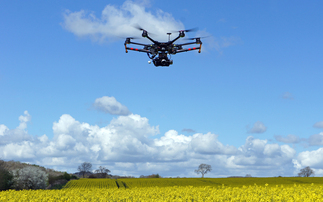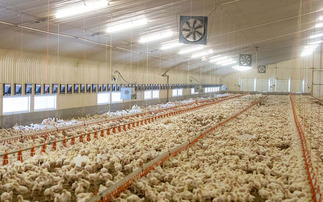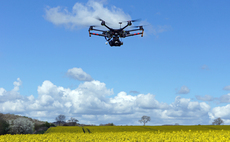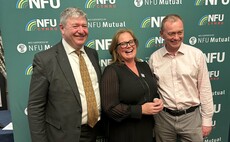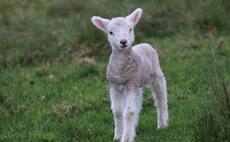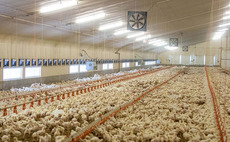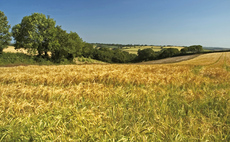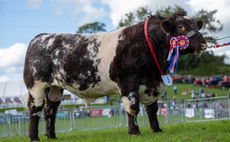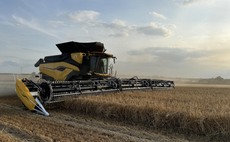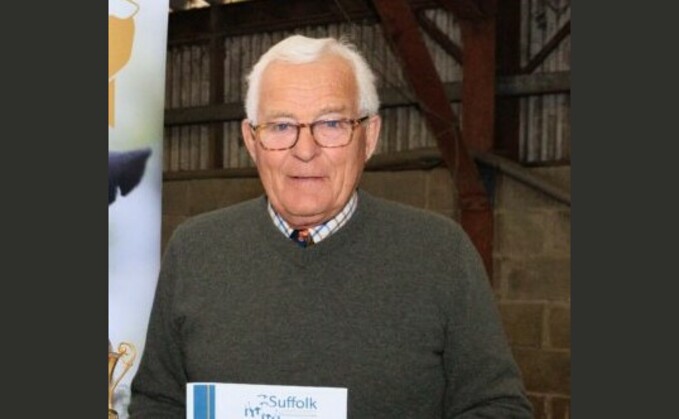
Stephen Cobbald said the Government needed to support farmers affected by bluetongue restrictions. "I have had conversations with farmers who just say 'I cannot do this anymore' because of the worry." (Suffolk Sheep Society)
A farmer in Suffolk has called on the Government to support food producers who are on the 'front lines' of bluetongue after claiming current restrictions have placed a 'huge toll' on farmers' businesses and well-being.
Sudbury farmer Stephen Cobbald has claimed he could lose upwards of £50,000 this year due to operating a business in a bluetongue restriction zone.
Despite having zero confirmed cases on farm, Mr Cobbald said it has been 'impossible' to sell his 250 pedigree Suffolk herd due to APHA's current restrictions on sheep movements.
READ NOW: Bluetongue concerns placing a 'heavy burden' on farmers' mental health
He said he has now missed the opportunity to sell livestock at auction marts in Carlisle and Essex as a consequence of needing a licence to operate livestock in and out of restrictied zones.
Since August 26, there have been more than 60 farms which have declared positive cases of the virus on farms in Suffolk, Norfolk, Essex, Kent, Lincolnshire and Yorkshire.
On August 30, the UK's Chief Veterinary Officer Christine Middlemiss had revoked 20km temporary control zones in Suffolk and Norfolk with a new restriction zone which regulates the movement of livestock from affected zone.
The restriction zone now encompasses Kent, Essex and Greater London East as well.
Now facing the realities of farming in a restricted zone, Mr Cobbald said it has been one of the most earth shattering of experiences he has ever faced.
"Current restrictions have been a nightmare for farmers in Suffolk like myself," he said.
"I have never experienced anything like this in my whole time of farming.
"So far, I have lost around £30,000 from not being able to attend markets following the new restriction zones in Suffolk and Norfolk.
"But I estimate if the restriction zones remain in place, I could lose another £20-25,000 if I cannot sell my shearling ewes this autumn.
"How are farmers expected to carry on knowing their livelihoods are at risk?
"Of course, the financial impact is devastating.
"It is now the stress involved with not being able to farm the way we can which is breaking farmers down physically and mentally.
"We have also had to contend with the driest August this year in Suffolk.
"It is just another burden we have to put up with.
"To go through bluetongue on top of this has been terrible.
"I have had conversations with farmers who just say 'I cannot do this anymore' because of the worry.
"This is not right."
Mr Cobbald said he believed current restrictions were 'not fit for purpose' in protecting farmers.
"�ļ�ֱ�� have simply been hung out to dry to deal with bluetongue on their own," he added.
"We have been provided with no guarantee about the efficacy of any vaccine which can prevent bluetongue either.
"It is simply a mess.
"Applying for a licence to move sheep has been so difficult.
"I just cannot obtain one and struggle to know those who have.
"Just remember, the important thing in farming is timing.
"If we cannot sell our stock at the right time, which is now, no one will want them.
"It is the work you put in to bringing young stock into the world, caring for them, ensuring they are healthy and fed, and now you are just left in limbo.
"It feels like the hard-work has all been for nothing.
"Being associated now with a restricted blue zone area has and will turn off a lot of businesses from buying our livestock from other parts of the country which is extremely concerning.
"�ļ�ֱ�� are just left on their own to deal with the consequences which leads to further misery for businesses which are already struggling to survive.
"There is a huge mental health crisis in farming at the moment, and we should not leave farmers out in the cold to fend for themselves.
"It is appalling."
The Suffolk farmer said the Government needed to deliver a response which provided farmers with financial support.
"We have no idea how long the virus will be with us," he added.
"It could be days, months, or years.
"It has just been another stress placed on the health of farmers.
"Nobody knows what is happening because the picture is changing on a daily basis.
"There just seems to be a lack of consideration for farmers trying to operate a business in a bluetongue zone.
"It feels like we cannot do our jobs and feed our families.
"We want this new Government to care about farmers and not place barriers in their way.
"We are on the front lines of this terrible disease and we need support."
Dr Middlemiss has stressed the current restriction zones put in place in England were helping to tackle the disease at this current time.
She said: "I know it makes life difficult for people in the restriction zone, but it really does stop the progression of the disease."
Defra has been approached for comment.







